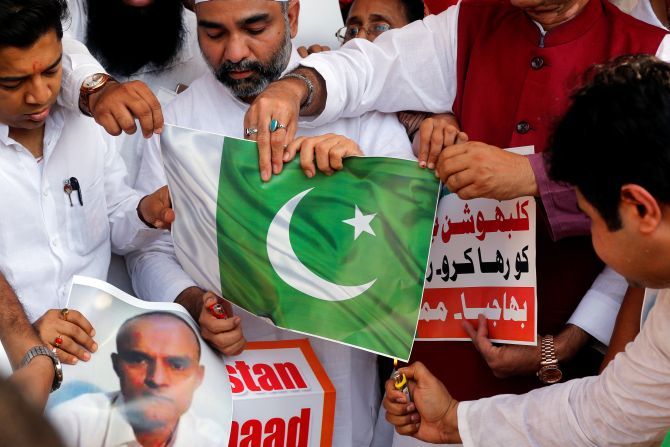
The Pakistan government on Friday faced flak over its handling of Indian national Kulbhushan Jadhav's case at the International Court of Justice, with several legal experts questioning the strategy adopted and asking why it accepted the global court’s jurisdiction.
The Hague-based court, the United Nation’s highest judicial body, had on Thursday stayed the execution of Jadhav, 46, considered to be a spy by Pakistan.
The ruling triggered criticism of the the Pakistan Foreign Office for its ‘poor handling’ and also for its choice of Khawar Qureshi, who represented Pakistan’s case before the ICJ.
The Attorney General for Pakistan had recommended some other counsel, The Express Tribune reported.
According to former Pakistan Bar Council vice chairman Farogh Naseem, Pakistan should have immediately withdrawn its March 29, 2017 declaration accepting the compulsory jurisdiction of the ICJ.
Instead of contesting the matter, Pakistan should have withdrawn the declaration immediately after India took Jadhav’s case to the ICJ, he said.
"Why did Pakistan not take the glaring and brutal human rights violations in Kashmir before the court, despite the fact that Islamabad had a strong case in this regard?” he said.
Former additional attorney general Tariq Khokhar, an expert in international law, regretted that Pakistan had accepted ICJ jurisdiction through a declaration, which should have been withdrawn once Pakistan knew that India would invoke the ICJ’s jurisdiction against it.
"Being an arbitration forum, each contesting state was allowed to nominate one person of its choice to act as an ad hoc judge at the ICJ...India did nominate one but Pakistan did not," Khokhar said, adding that Pakistan's counsel did not argue for the full allotted time either.
Eminent lawyer and human rights activist Asma Jahangir suggested that rather than making the ICJ ruling a matter of ego, "We should sit down, join our heads and find a way out by going through the ruling thoroughly."
"Who gave the opinion to deny consular access to Jadhav in the first place?" she asked.
International law expert Ahmer Bilal Soofi was of the view that Pakistan should prepare for the second phase of the case, which was ‘more important because it would be contested on merit and would provide Pakistan the chance to document India’s intervention inside Pakistan through Jadhav’.
Islamabad could insist on cooperation from India on the investigation into Jadhav’s activities, he said.
Former law minister S M Zafar said prime facie, it was a wrong decision. "I could not understand why the ICJ issued a stay order in the Jadhav case without even understanding the case.”
According to him, Pakistan should change its legal strategy and concentrate more on the terrorism angle.
A senior official told The Express Tribune that India had been successful in managing the ICJ’s registrar office, which has vast powers to fix cases before the court.
"We were very surprised how swiftly Jadhav’s case was fixed before the ICJ," he said.
A senior official in the law ministry told the Express Tribune that Pakistan’s lead lawyer Qureshi made two mistakes.
"He did not nominate ad hoc judge before the hearing and he did not respond to the argument of Indian lawyer regarding the 2008 bilateral agreement between India and Pakistan on consular access," he said.
The agreement says both the states will not give consular access to terrorists.
However, Harish Salve, counsel for India, contended that the agreement was not registered with the United Nations.
The official said the foreign office had also failed to register the bilateral agreement with the UN.
Legal experts recommended that as the government now has a couple of months to evolve future strategy, it should not take a decision on appointment of an ad hoc judge in haste.
They also wondered why Pakistan wanted to appoint foreigner as an ad hoc judge when every state prefers to nominate its own lawyers.
Pakistan Bar Council executive member Raheel Kamran Sheikh said it was matter of concern that success rate of Pakistan in international arbitration cases was 2 per cent while India's success rate was 60 per cent.
"We lost important cases at the international forum in the last couple of years. Likewise, we spent more than one billion rupees on lawyers' fees in those cases," he said.
Sheikh said mishandling of Jadhav's case was a classic example of how in the power struggle between military and political institutions, gaps in the foreign policy and national security perspectives had grown.
"And they [gaps] have grown to such an extent that if the situation is not arrested and improved immediately in the national interest by both the centres of power, irreparable damage shall be caused to the state," he said.
IMAGE: Supporters of the Bharatiya Janata Party burn Pakistan's national flag during a protest in Mumbai against the death sentence given to former Indian naval officer Kulbhushan Jadhav. Photograph: Shailesh Andrade/Reuters









 © 2025
© 2025